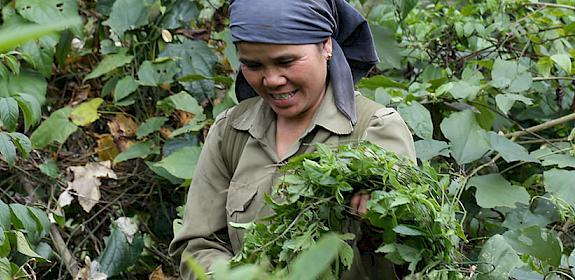Sustainable use of wild medicinal plants highlighted at traditional Chinese medicine Congress
Santa Clara, California, USA, 21st October 2013—More than 1,000 scholars, experts and practitioners of traditional Chinese medicine (TCM) met last month in Santa Clara at the 10th World Congress of Chinese Medicine (WCCM) and the celebration of the 10th Anniversary of the World Federation of Chinese Medicine Societies (WFCMS).

Themed with “Co-operation between Eastern and Western Medicine, better health services for people around the world”, WCCM 2013 celebrated the global growth and development of traditional Chinese medicine (TCM), participants exchanged experiences in medicine development, including the latest updates in relevant legislation, education, clinical practice and research.
Speaking at the opening event as a representative of the China Medical Pharmaceutical Material Association (CMPMA), Mr Liu Zhongliang, President of Wecome Pharmaceutical Ltd., noted it was the responsibility of all of CMPMA’s 3,800 member companies to ensure their medicines were prepared in a safe, efficient and controlled manner.
He also spoke about the European Union (EU)-funded Environmental Governance Programme (EGP) project to develop sustainable supply chains for medicinal products and emphasized the responsibility to protect the environment that lies with TCM companies.
Introducing a discussion on the sustainable sourcing of TCM ingredients, Mr Huang Jianyin, Vice Secretary-General of WFCMS noted: “This topic is of the highest importance to the WFCMS and its constituency, with the production and quality of TCM products reliant on both ecologically and socially acceptable production of medicinal plant ingredients.”
Sustainability in the sourcing of wild medicinal plants was also highlighted at the 5th Forum of the Trade Union of Genuine Regional Materia Medica (TUGRMM), which took place concurrently. TRAFFIC is a founder organization of TUGRMM, established under an EU-funded project in 2010.
Ms Chenyang Li, a Medicinal Plant Project Manager with TRAFFIC’s China Programme, spoke about TRAFFIC’s experiences in promoting the sustainable use of wild medicinal plants through implementation of the FairWild Standard.
“Securing the livelihoods of collectors and promoting sustainable wild harvesting and trade in wild medicinal and aromatic plants are central to TRAFFIC’s mission, and it is difficult to underestimate the importance of this work to the TCM industry,” said Ms Li.
Since 2013, TRAFFIC, together with its partners, WWF, WFCMS and Wecome Pharmaceutical Ltd, the major sponsor and CMPMA member, have been working with TCM industry representatives in Zhejiang and Hunan provinces to create and manage sustainable supply chains as part of an EGP project on “Engaging the Private Sector in sustainable management of medicinal plants – the multiplier effect”.
Ms Zoë Gardiner, Research and Development Project Manager with Traditional Medicinals Inc, a leading US manufacturer of herbal medicinal teas, explained how the company had been using the FairWild Standard since 2006 to ensure the sustainable and ethical production of medicinal plants collected from the wild.
“Use of the FairWild Standard has contributed to supply chain security, traceability and transparency, and quality assurance,” said Ms Gardiner.
“Implementing the FairWild Standard has helped to strengthen business relationships with our producers and to ensure a steady supply of high quality botanicals as demand for our products continues to increase.”
Implementing the FairWild Standard has helped to strengthen business relationships with our producers and to ensure a steady supply of high quality botanicals as demand for our products continues to increase.
—Ms Zoë Gardiner, Research and Development Project Manager, Traditional Medicinals Inc.
She also explained how working with local scientists and medicinal plant collectors has resulted in collaborative and community-based adaptive ecosystem management models and species-specific sustainable harvesting methods. Additionally, social premium funds for local and rural harvesting communities had been created to improve collectors’ livelihoods.
Both presentations were well received with several company representatives expressing interest in learning more from TRAFFIC about improving the sustainability of their supply chains.
 This communication has been produced with the financial assistance of the European Union. The contents of this communication are the sole responsibility of TRAFFIC and can under no circumstances be regarded as reflecting the position of the European Union.
This communication has been produced with the financial assistance of the European Union. The contents of this communication are the sole responsibility of TRAFFIC and can under no circumstances be regarded as reflecting the position of the European Union.




